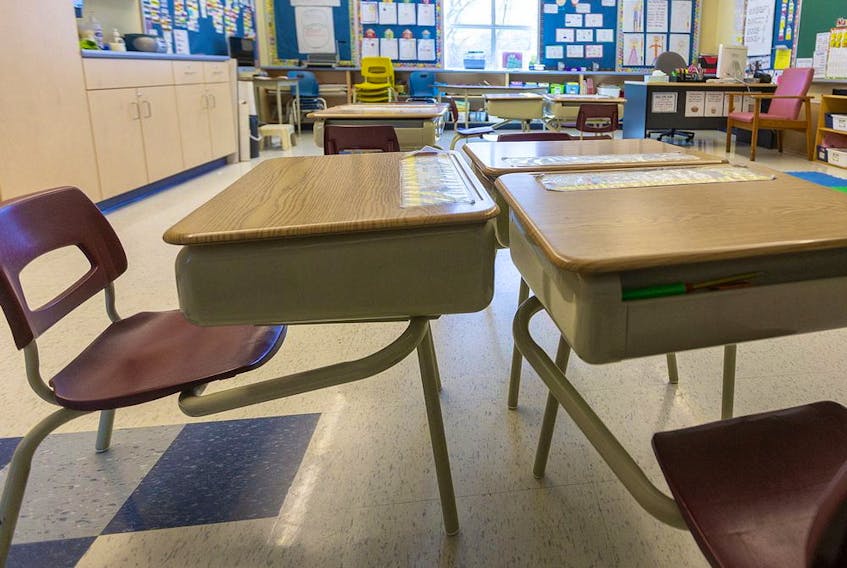It’s a lot simpler to close schools than it is to figure out how to open them while keeping everyone inside safe from the coronavirus.
We can criticize — with some justification — Nova Scotia Education Minister Zach Churchill, his department and the government for not putting a plan for schools on the table before now. Parents, teachers and the kids themselves have a right to know what to expect come September.
And they will, just as soon as the province figures it out. And there’s the rub.
Back in March, when COVID-19 arrived in Nova Scotia, closing the schools — along with just about everything else — was a no-brainer. We saw what happened in Italy, so we knew we had to “flatten the curve” or face a similar, terrible fate.
National and provincial political leaders and public health officials had a singular message, emphatically expressed by Premier Stephen Mcneil as “stay the blazes home.” It had the desired effect. With the exception of the tragedy in nursing homes, Canada has been relatively successful in controlling the spread of the virus.
Now, as more restrictions are lifted, we are moving into the next phase of the pandemic where, we're told, we have to learn to live with this virus.
Every day, more experts say a vaccine is many months or years away, if one is found at all. The World Health Organization has said the virus may never go away. Leading virologists, like the University of Alberta's David Marchant agree.
“I'm not optimistic that we'll find a vaccine in the next few years because we have so little data on the coronavirus,” Marchant, a Canada Research Chair in Viral Pathogenesis, said recently. We can hope he's wrong, but we need to act like he's right.
Living with COVID-19 will require a more comprehensive and far-reaching government response than was required to flattening the curve. How to open schools so everyone is safe is the tip of a very large and, as yet undeveloped, public policy iceberg.
The prospect of dealing with COVID-19 long-term requires a shift from the current approach of trying to eradicate the disease, which is simply not feasible, according to a group of present and past leaders in public health, health-care systems and health academics.
In a letter to Canada's 14 first ministers, the group advocates a balanced approach that protects those who are most vulnerable to severe outcomes from COVID-19, while allowing society — including the economy — to function and even thrive.
“The fundamental determinants of health — education, employment, social connection and medical and dental care — must take priority. Measures for COVID-19 control need to accommodate these health determinants. Children need to go to interact with their peers, in childcare, schools, sports and social activities, and summer camps. Adults need to go to work. Family and friends need to meet,” wrote the group, which includes former chief public health officers, deputy health ministers and leading health academics.
The goal, they said, must be to minimize the impact of COVID-19 using methods that are practical, effective and compatible with Canadian values and sense of social justice.
Among other things, that means carefully opening schools, businesses and health care, and allowing gatherings of friends and family while providing practical guidance that helps citizens and institutions to operate safely and effectively.
Governments need to work to restore public confidence that it is safe to go out, that appropriate precautions are in place, and conditions will be closely monitored.
There will be more outbreaks of COVID-19 so governments must develop clear plans to control them and avoid another universal lockdown.
The group said that the societal costs of maintaining strict public health measures over the long term are simply too high.
“There are increases in domestic violence, alcohol and drug intake, and food insecurity. The economic consequences are huge. This leads to increased unemployment which is related to increased deaths. And the toll on mental health is just beginning to be felt. Personal concerns about the disease ... loneliness and isolation, worries about jobs and finances, parents having to juggle childcare and general insecurity are leading to increased levels of anxiety, depression and stress.”
For more than four months Canadians have, for the most part, followed the lead of their governments to limit the damage of the lethal disease.
Now those same governments face a tougher test. With COVID-19 as an ever-present risk, they need to help Canadians restore — and improve — the social and economic life of the nation. Some are up to the task. Others, almost certainly, are not.








